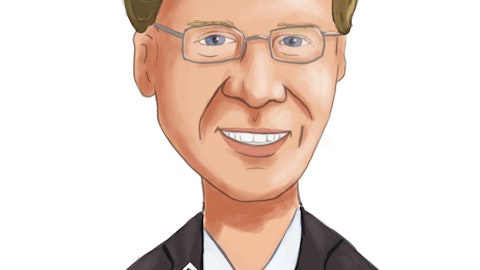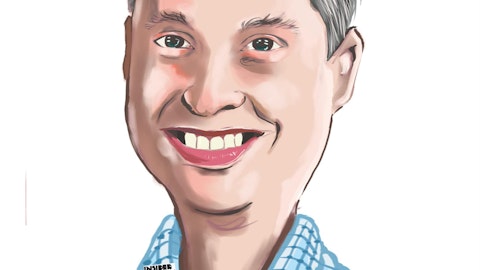Marc Parent: Look, on the second part of your question, on regards to that specific point in the recent DoD budget, and I would tell you, we influenced this in no €“ not an insignificant way. Funding was granted specific to address inflation. That’s public. And I can tell you, we’re working with our customers to address the inflationary items that have been €“ and I’ve mentioned this on previous calls that has definitely been a factor. And that results in €“ for us submitting requests for what’s called equitable adjustments or REAs. And we’ve submitted quite a bit, and it’s early in the process. Well, I could tell you, we have received some small adjustments, nothing material, I would say. And so, going back to what I mentioned with regards to budgets being approved and disruptions there.
To me is, look, we could see a prolonged continuous resolution environment defense. So look, that has a potential for delays to new program starts because if you’re in that, kind of environment, you can’t have a new program starts. So, we’re watching that. But I would tell you that even with that factor, it may affect the exact timing, but it doesn’t change my view with regards to sequential growth next year .
Kevin Chiang: Thank you. That’s very helpful. And maybe my second question here. You’ve alluded to now the past couple of quarters looking to return cash to shareholders, and it sounds like you like in a position to provide more details in the next fiscal year, but is there a framework we should be thinking about like are you looking at a targeted payout ratio on the dividend or in terms of buyback? Are you looking to return to what you were doing pre-pandemic. Is there any framework you can share with us or is it still being contemplated at the Board level still?
Sonya Branco: Yes. I think as we said, the first priority is really to de-lever. And we saw really good progress in Q3, bringing down the leverage ratio by almost half a turn and continue to be on track to our guidance. So then, we believe we’ll be in a better position to consider the return of capital to shareholders. I think it’s too soon to speak about a framework or form at this point.
Kevin Chiang: Okay. Actually just one last question for me. Just given the sequential increase in full-flight simulator deliveries expected in the fiscal Q4, any risks around supply chain or all the parts and things that you need to build and deliver those all, I guess, all in-house now and you’re just kind of ready to deliver this stuff by quarter end here?
Marc Parent: Well, you can never say zero risk because you never know what can hit you. But all those simulators are at customer sites as we speak. So, they’re built. So, it’s not an issue. So, as you know, we’re pretty experienced at delivering and certifying full-flight simulator. So, I’m marking some factor that I would qualify almost as an act of God, I think pretty good on us getting those simulators certified. And as I said, are no longer a factor when you consider there’s about six weeks left in the year.
Kevin Chiang: That’s super helpful. Thank you very much. Congrats again.
Marc Parent: And that’s by the way I got to shout that out €“ thanks to the €“ shout out to the hundreds of people that we have working in customer sites around the world doing that as we speak. And I applaud them because they are the heroes making this happen.
Operator: Thank you very much. We’ll get to our next question on the line is from Cameron Doerksen with National Bank Financial. Go ahead.





